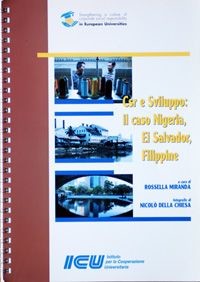 “The business world must take into account the efficiency but also social justice. There are some issues that are not regulated by a legal contract, issues related to social responsibility, for example related to the environment and also to the economic results of which companies have to recover and does so for those operating in Europe and America but also in Africa and Latin America. ”
“The business world must take into account the efficiency but also social justice. There are some issues that are not regulated by a legal contract, issues related to social responsibility, for example related to the environment and also to the economic results of which companies have to recover and does so for those operating in Europe and America but also in Africa and Latin America. ”
With these words, in June 2003, Amartya Sen, Nobel Memorial Prize in Economic Sciences, addressed to the authors and recipients of this research: “Globalization is the process by which you can exchange ideas and goods; trade and movement of people have enriched the world, so we have to defend it. At the same time, when we look at globalization we have to worry about how we can more evenly distribute its fruits. That’s why you have to worry not only of justice and efficiency. I think the core issue is not taking sides for or against globalization but to understand what globalization can achieve.”
This study, included in the project “Strengthening the culture of corporate social responsibility in European universities” supported by the European Commission, fully shares Indian economist idea. Globalisation represents a major growth opportunity for rich countries and even more so for those in the developing world, is an essential process that must facilitate rather than hinder; human well-being has, in fact, experienced a growth unprecedented in the last 40 years, all in the industrialized countries as in poorer ones, they have become three times richer. The average inhabitant of a Third World country now takes 38% of calories and illiteracy fell from 75% to less than 20%; the proportion of people worldwide who suffer from hunger fell from 35% in 1970 to 18% and is expected to fall to 12% in 2010. However, in the world there are still 800 million people suffering from hunger and the number of poor It is around 1.2 billion. And if the economic literature and empirical evidence agree that liberalization and market integration are the way out of hunger and poverty, it is clear that globalization can have negative consequences, in terms of social, especially in the most fragile environments such as those in the southern hemisphere: the proliferation of multinational enterprises and foreign direct investment in developing countries it is, for example, often associated with phenomena such as worker exploitation, misuse of the environment, insecurity. It ‘must, therefore, combat abuses practiced by Western firms in poor countries and foster a more equitable distribution of the benefits of globalization.
For this purpose, it is essential to promote socially responsible behavior in the private sector, particularly in what we invest in poor countries by encouraging the development of the concept of Corporate Social Responsibility and its related practices. In a globalized world there is need of global companies that are social, that is, they care about the problem of ensuring not only profit maximization but a more sustainable value maximization, expression of the welfare of the community: businesses should offer new guarantees involving production processes and further upstream, the “ethical” value of their choices.
The study suggests and presents the results of three studies that ICU has entrusted to the Lagos Business School in Nigeria, the University of Asia and the Pacific School of Management in the Philippines and the Catholic University of the West in El Salvador. Coordination of the work was carried out by Nicolò Della Chiesa and Rossella Miranda.
Building on the experience of the ICU, non-governmental organization engaged in cooperation projects in developing countries, the aim is to present the reality of foreign investment in those contexts and, above all, the views of those directly affected by phenomena in question. The research was carried out with the involvement of the sector management of European companies operating in selected countries, professors and university students through the distribution of questionnaires, the organization of workshops and numerous meetings. The work is based on a qualitative approach, because the desire that inspired it was to provide a reliable point of view that will provide with a real idea of the issues being studied.
The publication is part of the program: “Strengthening a culture of corporate social responsibility in european universities”, promoted by ‘in Italian universities with the support from the European Commission.



